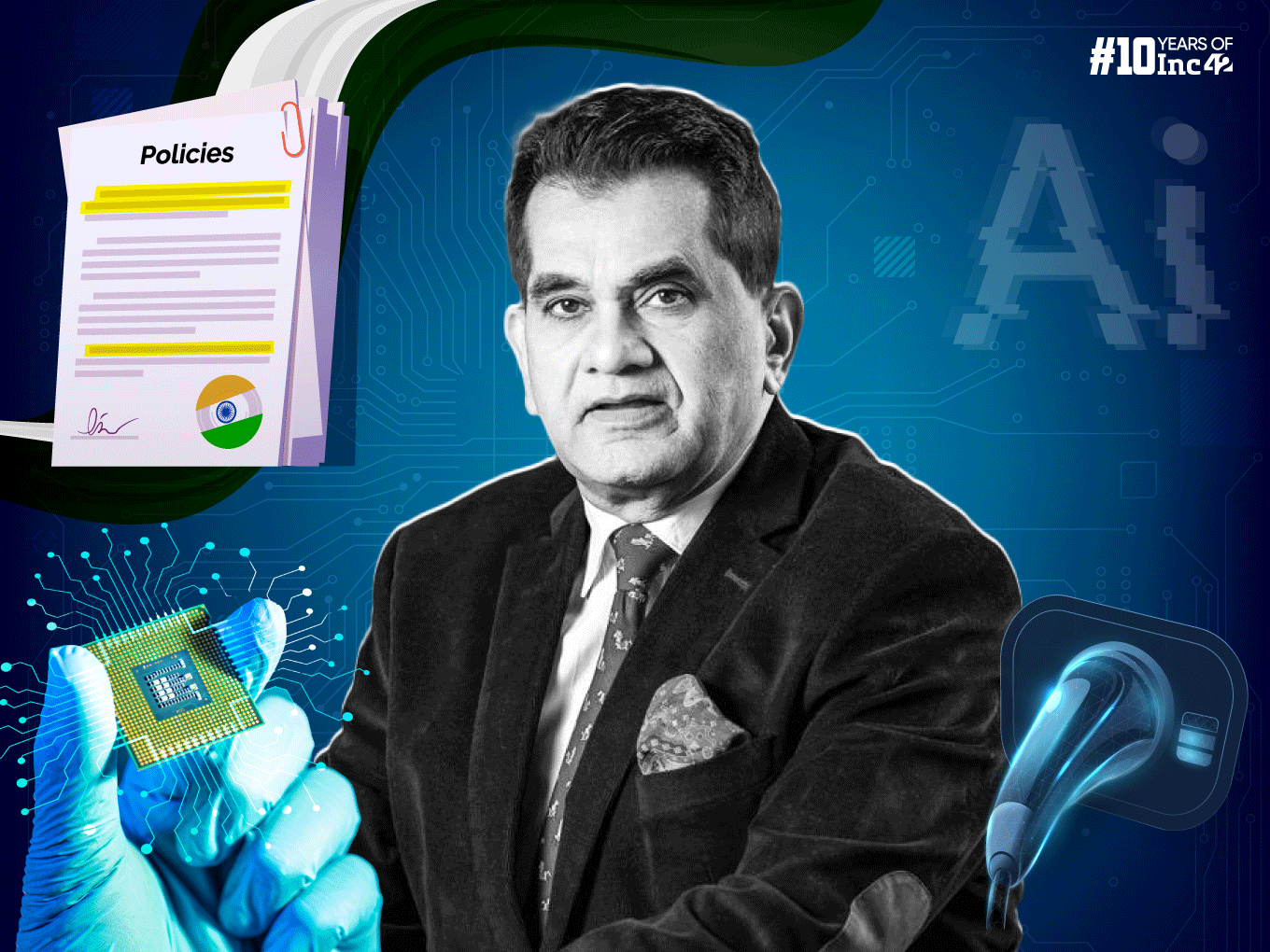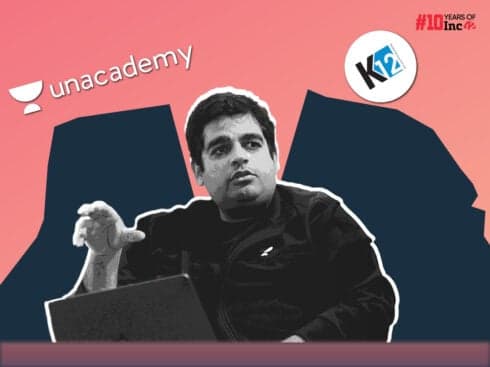The former CEO of NITI Aayog and current G20 Sherpa for India, Kant, is extremely optimistic about India’s semiconductor story, EV expansion and green hydrogen plans
According to him, the EV sector needs the government's support till 2030 to bring price parity and mitigate the upfront cost barrier of EVs
He said startups need to focus more on corporate governance and venture capitalists need to shift their focus from revenue to profitability
At a recent event in Bengaluru, the former CEO of NITI Aayog and current G20 Sherpa for India, Amitabh Kant, highlighted the potential of the Bengaluru-Mysore belt in Karnataka by stating that it could become the epicentre of the country’s semiconductor industry.
Kant said the region’s abundant minerals, water resources, and reliable electricity supply make it an ideal location for chip manufacturing and a global hub for semiconductor design.
While Kant was extremely optimistic about India’s semiconductor story, he said that one of the most critical steps for this industry would be semiconductor productisation, which essentially refers to transforming technical capabilities into tangible semiconductor products.
Interestingly, what seems to be shaping Kant’s perspective is the rising demand for electronic devices and the global search for alternative semiconductor hubs, beyond China, to fill this gap and meet worldwide chip demand.
It is imperative to mention that the country’s semiconductor industry, as per an Inc42 report, is expected to grow at a 24% CAGR to reach $150 Bn by 2030 from $33 Bn in 2023.
Moving on, given that Kant advises the Indian government on multiple policies and policy changes and has been extremely vocal about the developments and gaps in the Indian technology landscape, we tried to understand from him where the nation’s tech startup ecosystem is headed.
In a written response to Inc42’s queries, the former secretary of the Department of Industrial Policy & Promotion (now DPIIT) gave insights into the country’s burgeoning tech startup landscape and the government policies backing it.
He also called for patient capital from banks, pension funds, sovereign wealth funds, and insurance firms to ensure domestic funds support the Indian startup movement.
Talking about the country’s EV30@30 vision, which aims for 30% of all vehicles to be electric by 2030, the bureaucrat sought consistency in the FAME scheme.
From the need for government subsidies for the Indian EV ecosystem to the importance of domestic manufacturing of batteries, the roadmap for India’s growth policy in the next five years, and need for better corporate governance in startups, Kant said it all during the interview.
Here are the edited excerpts…
Inc42: What will policy changes look like in the next five years for the tech startup ecosystem after the new government takes over?
Amitabh Kant: In my view, the next five years will be the defining years for Indian startups and the digital economy, with some of the biggest startups set to go for public listings and AI changing the product and market dynamics.
Next-generation technologies like AI, quantum computing, cybersecurity, drone technology, remote sensing, biotech and genomics, semiconductors, AR & VR, and web3 will redefine India.
The country will also be redefined by the implementation of responsible AI in the healthcare and retail sectors, ensuring data security and privacy through the enactment of the Digital Personal Data Protection (DPDP) Act.
The country will have to ensure 100% penetration of the BharatNet Program and fibre network across all the villages and gram panchayats in the next two to three years.
Drone technology will be pushed big time in the next five years under the ‘Make in India’ initiative.
Inc42: As India aims for significant growth in next-generation technologies, is the lack of skills an issue? Are there enough skilled professionals in the country? How do skilled people prepare for AI, ML, and other Industry 4.0 technologies?
Amitabh Kant: Skill development is a key focus for India as the country has more than 50% of its population below the age of 25 and more than 65% below the age of 35. The average age of an Indian is 29 years, compared to 37 in China and 48 in Japan.
Hence, it is critical to ensure the right skill development of youth so that they are absorbed in the skilled and semi-skilled workforce. Also, promoting degree apprenticeship will be key to employability.
In the semiconductor space, the nodal agency Indian Semiconductor Mission (ISM) will have to be equipped with the right workforce and expertise as they will play a pivotal role in the development of the country’s semiconductor ecosystem.
Secondly, the requirement for software engineers who have expertise in the semiconductors and automotive sectors will grow.
As the top 500 corporates would need over a million AI/ML experts and data scientists, all skilled professionals will have to keep themselves updated with the latest technology in cybersecurity, AI-ML through certifications, short-term courses, etc.
Inc42: What is your take on India’s EV policy? Will FAME-III come into the picture? If yes, why is it important and what should it entail? Are subsidies still necessary for the sector?
Amitabh Kant: In FY24, EVs accounted for only 5% of the total vehicle sales in the country. If we want to achieve the EV30@30 vision, we have to ensure FAME-III policy consistency.
The INR 10,000 Cr subsidy under FAME-II pushed the EV sales growth. Hence, there is a need to continue subsidies and incentives under FAME-III, with a focus on public transport and charging infra for the next five years.
The EV sector needs the government’s support till 2030 to bring price parity and mitigate the upfront cost barrier of EVs.
Additionally, the private sector must understand that post-2030, there will be no further support from the government. This will help the ecosystem grow gradually, adapt to future challenges, and make India an export hub for EVs.
Meanwhile, to develop the EV ecosystem, there is a need to push various initiatives, including the development of charging infrastructure, developing low-cost financing solutions for EVs, promotion of public transportation, including ebuses, and pushing for secondary market development of EVs.
Inc42: What’s happening on the battery technology front? Where are we still lacking and what can the government do to improve it?
Amitabh Kant: India’s import bill from batteries touched $2 Bn in 2023, with over 85% of imports from China (including Hong Kong). India, therefore, must do domestic manufacturing of batteries. We cannot keep depending on China.
I think the awarding of the balance 20 GWh of the PLI ACC programme must be completed as soon as possible by the Ministry of Heavy Industries (MHI) and Ministry of New and Renewable Energy (MNRE), as there is growing demand and dependency on batteries for the energy transition and decarbonisation pathway.
Besides, out of the 30 GWh already awarded, a project monitoring unit (PMU) needs to be formed to monitor the scheme and ensure strict implementation and adherence to timelines, as beneficiaries have made little progress in the last two years.
Moreover, there must be operationalisation of niche battery technologies through a dedicated scheme for new chemistries like solid state, sodium ion, redox flow, metal batteries, etc., as there is a need for safer batteries, which can last longer and are more energy efficient for heavy transport, aviation, drone technology and grid storage use.
Inc42: What’s the next big thing expected to happen in the semiconductor sector from a policy standpoint? Is there a scope for improvement in policies?
Amitabh Kant: The semiconductor industry represents the heartbeat of the modern global digital economy and is expected to be $1 Tn by 2030. Currently, 65% of the global share is with China, and India imported chips worth INR 1.5 Lakh Cr in 2023. The critical step from here on is the semiconductor productisation, from the silicon idea into a manufacturable product. A nation that can complete all the steps for 100% of the productisation process will lead to technological advancement.
Hence, developing the supply chain ecosystem from foundry, equipment, intellectual properties (IPs), design, assembly, test, marking, and packaging will ensure value addition.
Going forward, the key improvements will be setting standards for semiconductors, establishing stable IP partnerships, building ISM expertise, and creating the right financing instruments.
Inc42: What is your take on India’s Green Hydrogen Mission?
Amitabh Kant: Green hydrogen will offer a solution to the needs that are hard to meet through direct electrification, mitigating close to 20% of CO2 emissions. Presently, the Green Hydrogen Mission, with an outlay of INR 19,744 Cr, is expected to facilitate the deployment of the green hydrogen ecosystem and create opportunities for innovation and investments across the value chain, translating into investments, jobs, and economic growth.
Given the substantial market in India for hydrogen, it is critical to upscale the production and deployment of high-performance electrolysers from existing 2-4 GW/annum to 25-30 GW/annum capacity in the next 3-5 years with new technologies.
Harmonising green hydrogen standards, establishing dedicated green hydrogen hubs, and mandating green hydrogen consumption for industries with bulk hydrogen demand can be measures to work towards in the next five years.
Inc42: Does the increasing number of startup IPOs indicate the maturity of the startup ecosystem? What impact will it have on the ecosystem in terms of funding and global attention?
Amitabh Kant: While startups going public adds maturity to the Indian startup ecosystem and depth to the stock market, it also opens up opportunities for retail investors. Hence, there is a clear need to rethink the strategies of the startup ecosystem as India harbours an ambitious goal of becoming a $35 Tn economy by 2047. They need to focus on better corporate governance, which has been endorsed during the G20 summit.
Besides, venture capitalists should shift their focus from quantity to quality, and revenue to profitability. They must avoid quick exits and focus on sustainable growth while prioritising shareholder profit over shared prosperity.
Also, there is a clear need for patient capital from banks, pension funds, sovereign wealth funds, and insurance firms to ensure domestic funds support the Indian startup movement.
We also need to create a Fund of Funds for deeptech sectors so that there is risk sharing with VCs.
































 Ad-lite browsing experience
Ad-lite browsing experience